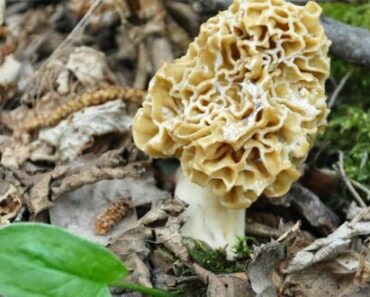As a forager, I’ve always been fascinated to discover that certain herbs can not only prevent various health problems but also aid in their treatment. When it comes to kidney health issues, Bearberry, Nasturtium, and Stinging Nettle are among the most commonly used herbs due to their healing properties. These herbs have been utilized for centuries, and their use can be traced back to ancient times.
For example, Bearberry, also known as uva ursi, was employed by the Native Americans to treat urinary tract infections and other kidney-related problems.
Nettle has been used for medicinal purposes since the Bronze Age. In ancient Greece, it was utilized to treat kidney and urinary tract issues. Similarly, nasturtium has been used to treat urinary tract infections, and its recorded use goes back to the Incas, who used it to treat kidney problems.
These herbs have passed the test of time and are commonly used today for their remarkable healing properties. They are readily available and can be administered in various forms, such as teas, capsules, or extracts. Incorporating these herbs into your diet can help maintain healthy kidney function and prevent complications.
The kidneys are the cleansing organs of your body
The human body houses two kidneys situated on each side of the spine in the lower back region. These small yet powerful organs play a crucial role in maintaining your overall health and well-being by filtering out waste products and all the excess fluids from the bloodstream, which are then expelled in the form of urine.
With an oval shape similar to a bean, the kidneys are characterized by a smooth surface and a dark reddish-brown hue. The renal artery, which supplies the kidneys with blood, goes into the central part of the organ, while the ureter, a muscular tube, carries urine out of the kidneys and into the bladder for eventual expulsion from the body.
Apart from regulating our fluid and electrolyte balance, the kidneys perform a host of other vital functions, including producing hormones that help regulate blood pressure, stimulate the production of red blood cells, and even help us maintain strong bones. Given the critical role the kidneys play in our health, it’s essential to take care of them.
How the kidneys are structured
Located within the protective confines of the fibrous tissue pouch, the kidney is a complex organ comprising various structures that work in tandem to filter waste substances from the bloodstream. At the center of the kidney lies the renal pelvis, which is connected to several calyxes that collect and channel the waste products expelled by the organ.
The kidney is composed of a darker core matter and a lighter surface and is situated adjacent to the suprarenal gland. The organ is further shielded from damage by connective tissue that is thickened by fat.
The renal arteries, so named due to their proximity to the kidneys (ren in Latin), are responsible for supplying blood to the organ. These arteries divide into smaller vessels, which ultimately culminate in tiny, coiled clusters within the core of the kidney. These clusters act as filters, allowing blood to flow through while filtering out waste products.
The fundamental unit of the kidney is the nephron, derived from the Greek word nephros, meaning kidney. The average human kidney contains around one million nephrons, each made of a renal corpuscle and a renal tubule. It is through these microscopic units that urine is produced and led into the renal pelvis before being expelled through the ureter.
Remarkably, in a state of calm, an average of 1 liter of blood flows through the kidney each day, underscoring the essential role that this organ plays in maintaining our overall health and well-being.
Keep your kidneys healthy
The kidneys are an integral component of the body’s intricate network of biological processes. They play a vital role in the excretion of toxins from the body, helping to maintain a healthy balance of electrolytes, and also producing hormones that were found to stimulate production of red blood cells and promote bone health.
Moreover, the kidneys play an essential endocrine role in the body, secreting hormones that regulate blood pressure and fluid balance. They also help to regulate blood glucose levels by producing a hormone called renin, which activates the production of angiotensin, a potent vasoconstrictor that raises blood pressure.
Given the myriad of vital functions that the kidneys perform, their failure can have catastrophic consequences for the body as a whole. When the kidneys fail, the body becomes unable to cleanse itself effectively, and waste substances begin to accumulate in the bloodstream, leading to a range of complications such as anemia, bone disease, and nerve damage.
Acute kidney failure, which lasts for less than three months, can be caused by a sudden injury or illness, while chronic kidney failure, which lasts for more than three months, is usually the result of long-term damage to the kidneys caused by conditions such as diabetes, hypertension, or chronic glomerulonephritis.
It’s therefore critical to take care of our kidneys by adopting healthy habits such as staying hydrated, maintaining a balanced diet, avoiding excessive alcohol consumption, and not smoking. Early detection and treatment of kidney problems can also help prevent or slow the progression of kidney disease, minimizing the risk of potentially fatal complications.
Bearberry
Bearberry (uva ursi) is a hardy plant that resembles the cranberry shrub with its dark green oval-shaped leaves. It can be found growing in bushy areas all around the world, including Asia, and North America, but also in a large part of Europe. Some bearberry plants have been known to live for up to 100 years, showing their hardiness and resilience.
In the spring, Bearberry produces delicate white or pink flowers that grow in clusters. These flowers give way to small, sour red drupes that are rich in antioxidants and other beneficial compounds. The leaves of the bearberry plant are particularly prized for their medicinal properties.
The leaves of the bearberry plant contain several natural disinfectants, including arbutin, methylarbutin, and tannins. These substances have been found to be effective in treating inflammation of the urinary tract, urinary bladder, and renal pelvis, as well as kidney stones. Bearberry is also used to help alleviate the symptoms of urinary tract infections and to promote the overall health of the urinary system.
However, it’s important to note that Bearberry should not be used long-term, as it can cause liver damage and other side effects when taken in high doses or for extended periods. It’s best to consult with your doctor before using Bearberry as a supplement or herbal remedy.
Bearberry tea
To prepare a cup of bearberry tea, you will need two teaspoons of chopped bearberry leaves and one cup of water.
Begin by placing the Bearberry leaves into an empty cup, then pour hot water over them. Allow the tea to steep for approximately 10 minutes, then strain the leaves from the liquid. Be careful not to use boiling water, as this can result in a bitter taste and may also eliminate some of the healing properties of the tea.
It’s recommended to drink bearberry tea every other day to promote the health of your urinary system. However, it’s important to note that bearberry tea should not be consumed in excess, as it may cause side effects such as nausea, vomiting, and liver damage.
This tea can be used for urinary tract cleansing.
Nasturtium
During the summer months, nasturtiums bloom with vibrant petals in shades of red, orange, and yellow, making them a popular addition to gardens around the world. This beautiful plant originates from South America, but it has now spread to different parts of the globe.
Nasturtiums are known for their ornamental value, but they also possess several healing qualities that few folks are aware of. The seeds, flowers, and leaves of the plant can help treat several ailments. Nasturtium juice is also sometimes used for its medicinal benefits. The green parts of the plant can be harvested throughout the growing season, while the fruits, which are known as Poor Man’s capers, should only be picked when they have ripened.
Nasturtiums contain natural antibiotics that can kill bacteria like staphylococcus, streptococcus, and salmonella. After ingestion, these antibiotic compounds are released from the body through urine, thereby disinfecting the urinary tract. This makes nasturtiums useful for treating both acute and chronic inflammation of the urinary tract.
Additionally, with the help of clinical trials it was proven that Nasturtium has anti-inflammatory and antioxidant properties, making it a popular natural remedy for a range of health conditions.
Nasturtium smoothie
One way to incorporate this plant into your diet is by making a nourishing and refreshing smoothie. To prepare such a smoothie, you will need a handful of young nasturtium leaves, juice from half a lemon, a green apple, a handful of baby spinach leaves, one cup of water, and one1 tablespoon of brown sugar.
Peel the apple, remove the core, and slice it into four pieces. Put all the ingredients in your blender and blend until smooth. Drink the smoothie once a day to reap the benefits of nasturtium’s natural antibiotic properties.
This smoothie will help you fight urinary tract infections.
Stinging Nettle
Nettle, a three-foot-tall herb that is often considered a weed, can be found growing in ditches, rubble sites, and open forests. Most of us have experienced the unpleasant sting of nettle at some point in our lives, but don’t be fooled by its bad reputation because nettle has numerous healing qualities that make it a very useful plant.
While the whole plant has healing properties, the leaves are the most commonly picked part of the plant. The best time for picking is from June to September, and it’s important to wear gloves to avoid being stung.
The young plants have the most potent healing qualities but also cause the most intense burning sensation, which can be eliminated by heating up or drying the leaves. In fact, the burning sensation has its own medicinal uses. In the past, Native Americans used to whip themselves with nettles to heal rheumatic joints.
Nettle contains various acids, such as silicic and formic acid, as well as acetylcholine, which is the chief neurotransmitter of our nervous system. It is also rich in vitamin B and a variety of different compounds containing iron, calcium, or potassium.
Both the leaves and stem have diuretic effects, and young leaves have been found to lower blood sugar levels and cleanse the blood, making them a popular supplement for diabetes treatment. Additionally, nettle can help to reduce swelling, treat rheumatism, and aid in the treatment of inflammation of the urinary tract and kidneys.
Stinging nettle tea
To make nettle tea, you’ll need one tablespoon of chopped nettle leaves, fresh or dried, and one cup of water. Begin by pouring hot water over the nettle leaves, then cover and let them infuse for 10 minutes before straining.
This tea can be used against urinary tract inflammation, but it’s also helpful for treating kidney stones.
Other recommendations for healthy kidneys
As we mentioned earlier, taking care of our kidneys is vital for our health and well-being. If you’re struggling with kidney issues, there are some simple good practices you can start today to help improve their functions.
It’s important to maintain a healthy diet, avoiding processed and unhealthy foods. Additionally, smoking should be avoided as it can lead to the hardening of the arteries, which puts a strain on the kidneys.
If you’re overweight, losing weight can also help relieve pressure on the kidneys. Exercise is another great way to support kidney health, as it helps to lower blood pressure, reduce stress, and boost immunity.
It’s important to limit alcohol intake and drink plenty of water. The recommended daily water intake is around 16 cups for men and 12 cups for women. It’s also a good idea to drink tea or eat soups, and avoid unhealthy drinks like coffee, black tea, or alcohol.
Eating a balanced diet with sufficient vitamins, minerals, and nutrients is essential for kidney health. Avoiding excessive protein or meat consumption can also help relieve stress on the kidneys. Additionally, it’s best to avoid preservatives, stabilizers, and excessive medication, as these can all harm the kidneys.
If you take care of your body and follow these guidelines, you can support your kidney health and enjoy a healthier, happier life.




























